Effect of British Colonization on Hinduism
VerifiedAdded on 2022/11/15
|12
|3325
|83
AI Summary
This essay discusses about the effect of the British Colonization on the aspect of Hinduism. It argues that the British colonization had a damaging effect on the Indians as it shifted the value system of the Indians.
Contribute Materials
Your contribution can guide someone’s learning journey. Share your
documents today.
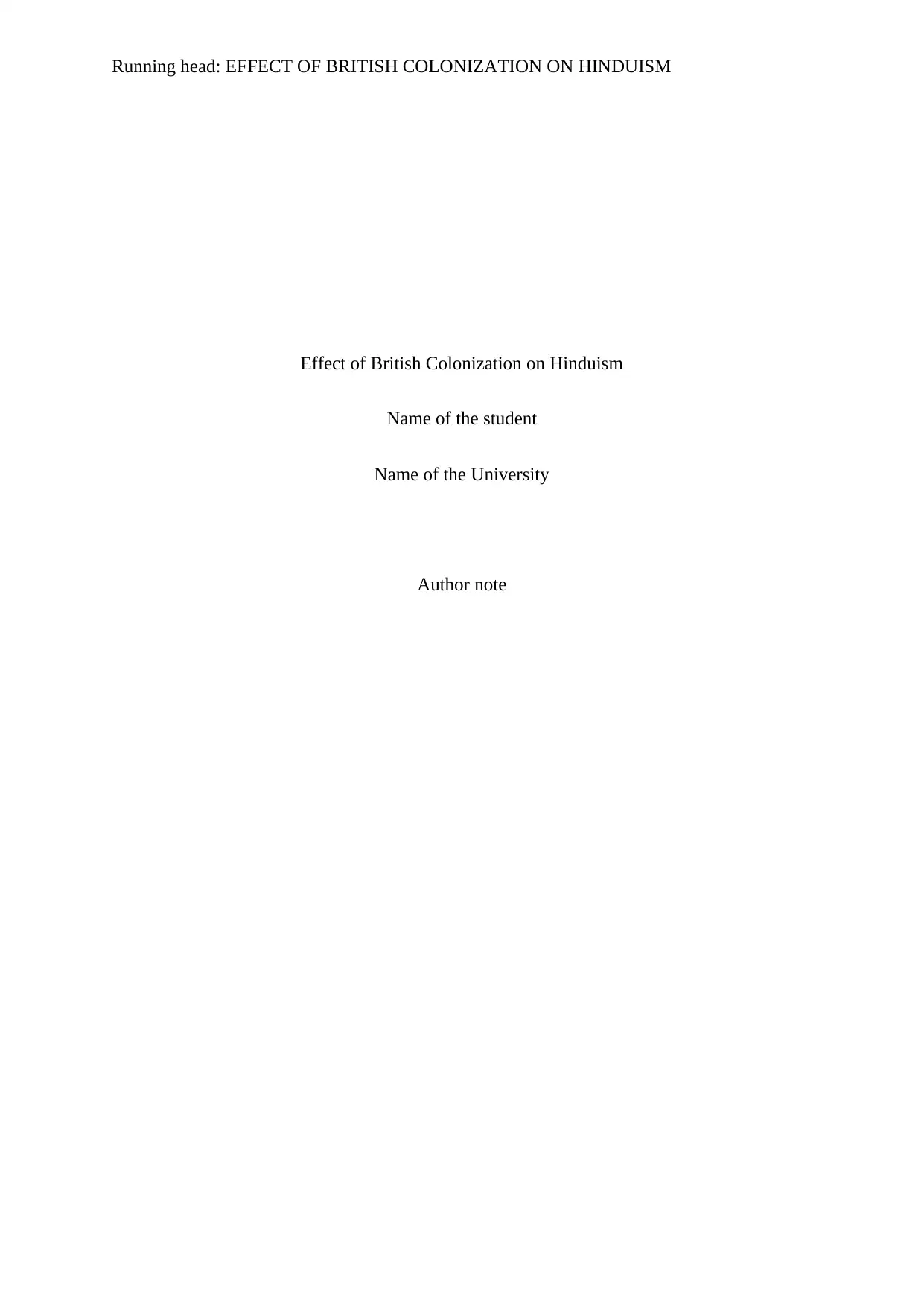
Running head: EFFECT OF BRITISH COLONIZATION ON HINDUISM
Effect of British Colonization on Hinduism
Name of the student
Name of the University
Author note
Effect of British Colonization on Hinduism
Name of the student
Name of the University
Author note
Secure Best Marks with AI Grader
Need help grading? Try our AI Grader for instant feedback on your assignments.
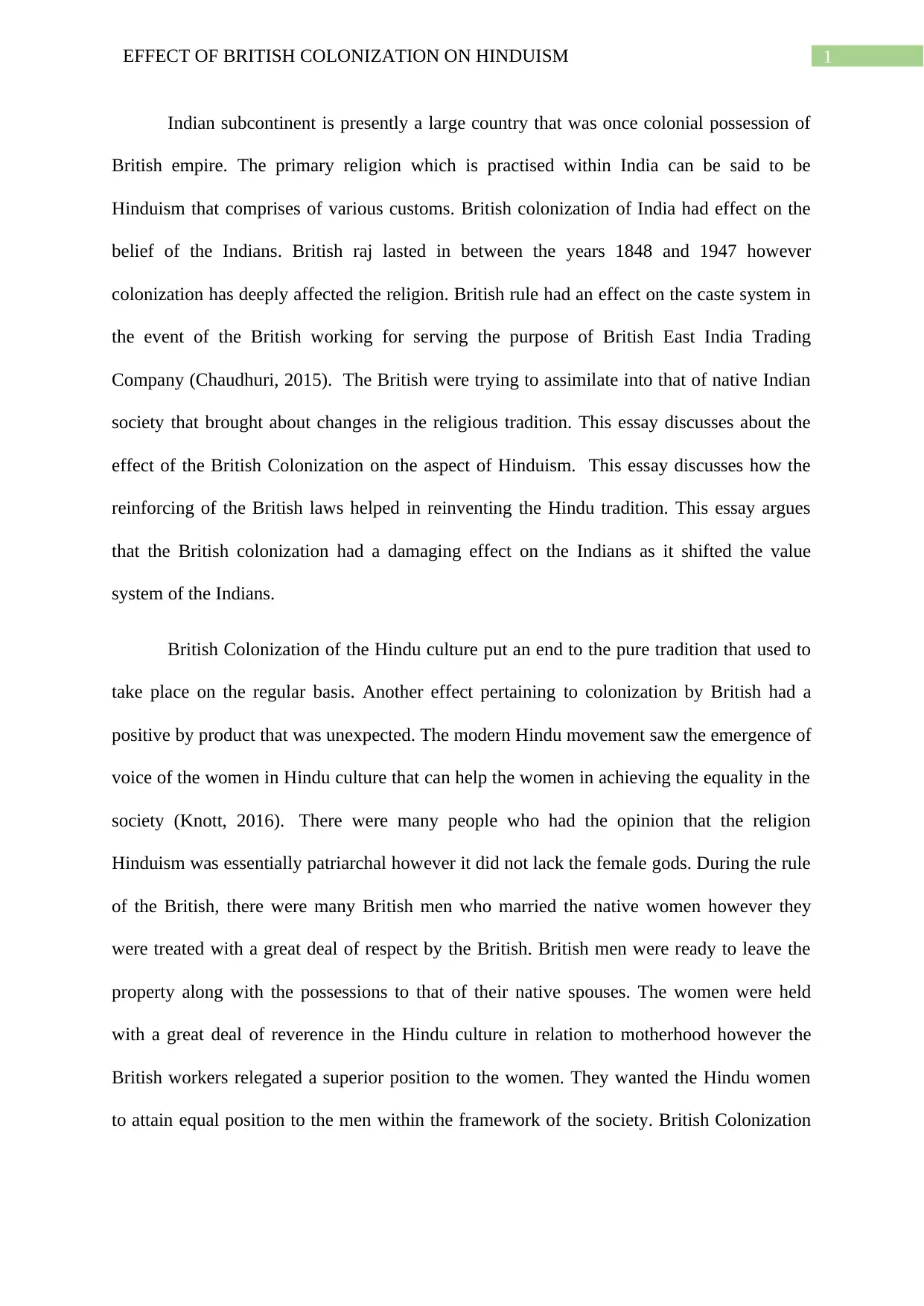
1EFFECT OF BRITISH COLONIZATION ON HINDUISM
Indian subcontinent is presently a large country that was once colonial possession of
British empire. The primary religion which is practised within India can be said to be
Hinduism that comprises of various customs. British colonization of India had effect on the
belief of the Indians. British raj lasted in between the years 1848 and 1947 however
colonization has deeply affected the religion. British rule had an effect on the caste system in
the event of the British working for serving the purpose of British East India Trading
Company (Chaudhuri, 2015). The British were trying to assimilate into that of native Indian
society that brought about changes in the religious tradition. This essay discusses about the
effect of the British Colonization on the aspect of Hinduism. This essay discusses how the
reinforcing of the British laws helped in reinventing the Hindu tradition. This essay argues
that the British colonization had a damaging effect on the Indians as it shifted the value
system of the Indians.
British Colonization of the Hindu culture put an end to the pure tradition that used to
take place on the regular basis. Another effect pertaining to colonization by British had a
positive by product that was unexpected. The modern Hindu movement saw the emergence of
voice of the women in Hindu culture that can help the women in achieving the equality in the
society (Knott, 2016). There were many people who had the opinion that the religion
Hinduism was essentially patriarchal however it did not lack the female gods. During the rule
of the British, there were many British men who married the native women however they
were treated with a great deal of respect by the British. British men were ready to leave the
property along with the possessions to that of their native spouses. The women were held
with a great deal of reverence in the Hindu culture in relation to motherhood however the
British workers relegated a superior position to the women. They wanted the Hindu women
to attain equal position to the men within the framework of the society. British Colonization
Indian subcontinent is presently a large country that was once colonial possession of
British empire. The primary religion which is practised within India can be said to be
Hinduism that comprises of various customs. British colonization of India had effect on the
belief of the Indians. British raj lasted in between the years 1848 and 1947 however
colonization has deeply affected the religion. British rule had an effect on the caste system in
the event of the British working for serving the purpose of British East India Trading
Company (Chaudhuri, 2015). The British were trying to assimilate into that of native Indian
society that brought about changes in the religious tradition. This essay discusses about the
effect of the British Colonization on the aspect of Hinduism. This essay discusses how the
reinforcing of the British laws helped in reinventing the Hindu tradition. This essay argues
that the British colonization had a damaging effect on the Indians as it shifted the value
system of the Indians.
British Colonization of the Hindu culture put an end to the pure tradition that used to
take place on the regular basis. Another effect pertaining to colonization by British had a
positive by product that was unexpected. The modern Hindu movement saw the emergence of
voice of the women in Hindu culture that can help the women in achieving the equality in the
society (Knott, 2016). There were many people who had the opinion that the religion
Hinduism was essentially patriarchal however it did not lack the female gods. During the rule
of the British, there were many British men who married the native women however they
were treated with a great deal of respect by the British. British men were ready to leave the
property along with the possessions to that of their native spouses. The women were held
with a great deal of reverence in the Hindu culture in relation to motherhood however the
British workers relegated a superior position to the women. They wanted the Hindu women
to attain equal position to the men within the framework of the society. British Colonization
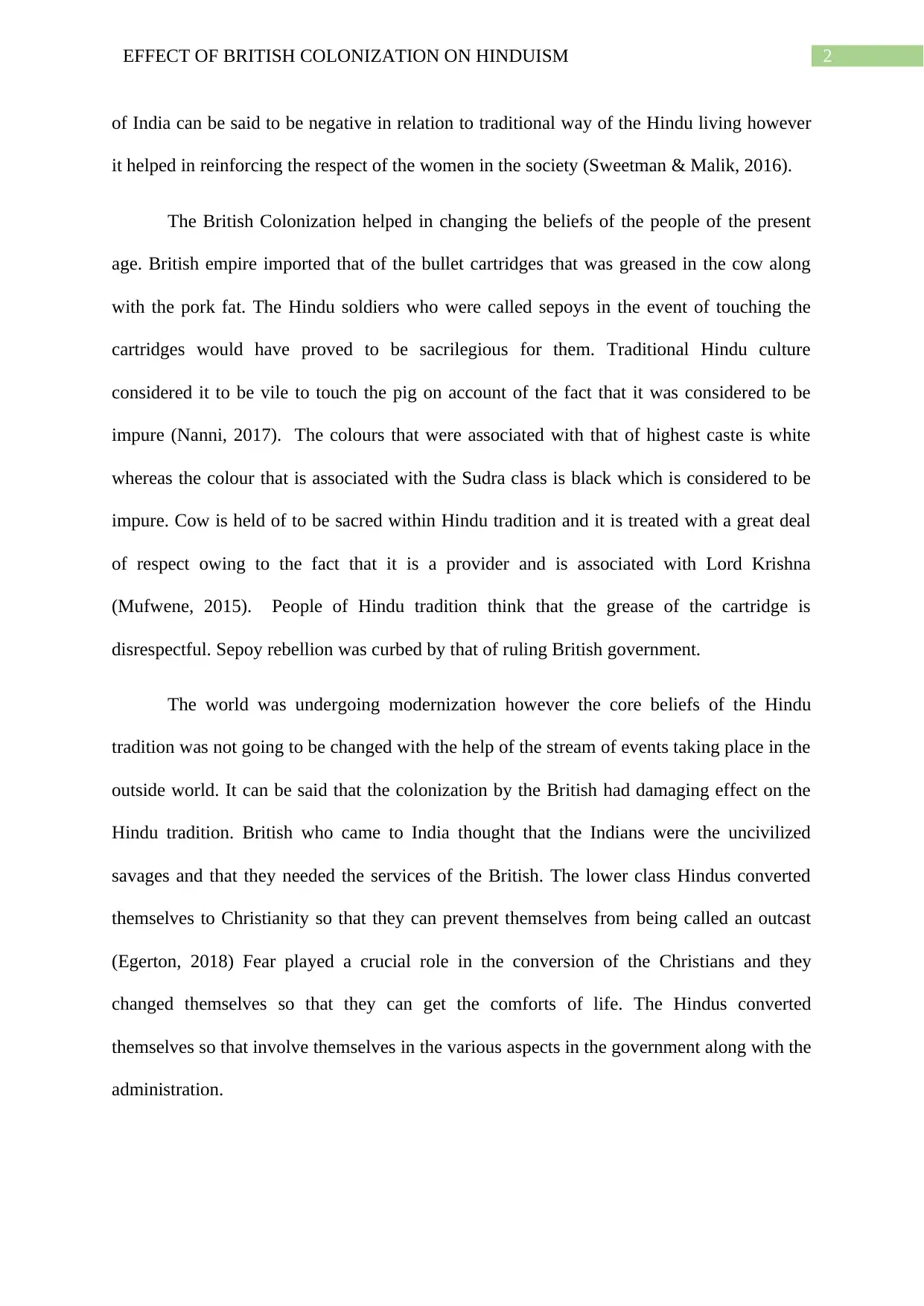
2EFFECT OF BRITISH COLONIZATION ON HINDUISM
of India can be said to be negative in relation to traditional way of the Hindu living however
it helped in reinforcing the respect of the women in the society (Sweetman & Malik, 2016).
The British Colonization helped in changing the beliefs of the people of the present
age. British empire imported that of the bullet cartridges that was greased in the cow along
with the pork fat. The Hindu soldiers who were called sepoys in the event of touching the
cartridges would have proved to be sacrilegious for them. Traditional Hindu culture
considered it to be vile to touch the pig on account of the fact that it was considered to be
impure (Nanni, 2017). The colours that were associated with that of highest caste is white
whereas the colour that is associated with the Sudra class is black which is considered to be
impure. Cow is held of to be sacred within Hindu tradition and it is treated with a great deal
of respect owing to the fact that it is a provider and is associated with Lord Krishna
(Mufwene, 2015). People of Hindu tradition think that the grease of the cartridge is
disrespectful. Sepoy rebellion was curbed by that of ruling British government.
The world was undergoing modernization however the core beliefs of the Hindu
tradition was not going to be changed with the help of the stream of events taking place in the
outside world. It can be said that the colonization by the British had damaging effect on the
Hindu tradition. British who came to India thought that the Indians were the uncivilized
savages and that they needed the services of the British. The lower class Hindus converted
themselves to Christianity so that they can prevent themselves from being called an outcast
(Egerton, 2018) Fear played a crucial role in the conversion of the Christians and they
changed themselves so that they can get the comforts of life. The Hindus converted
themselves so that involve themselves in the various aspects in the government along with the
administration.
of India can be said to be negative in relation to traditional way of the Hindu living however
it helped in reinforcing the respect of the women in the society (Sweetman & Malik, 2016).
The British Colonization helped in changing the beliefs of the people of the present
age. British empire imported that of the bullet cartridges that was greased in the cow along
with the pork fat. The Hindu soldiers who were called sepoys in the event of touching the
cartridges would have proved to be sacrilegious for them. Traditional Hindu culture
considered it to be vile to touch the pig on account of the fact that it was considered to be
impure (Nanni, 2017). The colours that were associated with that of highest caste is white
whereas the colour that is associated with the Sudra class is black which is considered to be
impure. Cow is held of to be sacred within Hindu tradition and it is treated with a great deal
of respect owing to the fact that it is a provider and is associated with Lord Krishna
(Mufwene, 2015). People of Hindu tradition think that the grease of the cartridge is
disrespectful. Sepoy rebellion was curbed by that of ruling British government.
The world was undergoing modernization however the core beliefs of the Hindu
tradition was not going to be changed with the help of the stream of events taking place in the
outside world. It can be said that the colonization by the British had damaging effect on the
Hindu tradition. British who came to India thought that the Indians were the uncivilized
savages and that they needed the services of the British. The lower class Hindus converted
themselves to Christianity so that they can prevent themselves from being called an outcast
(Egerton, 2018) Fear played a crucial role in the conversion of the Christians and they
changed themselves so that they can get the comforts of life. The Hindus converted
themselves so that involve themselves in the various aspects in the government along with the
administration.
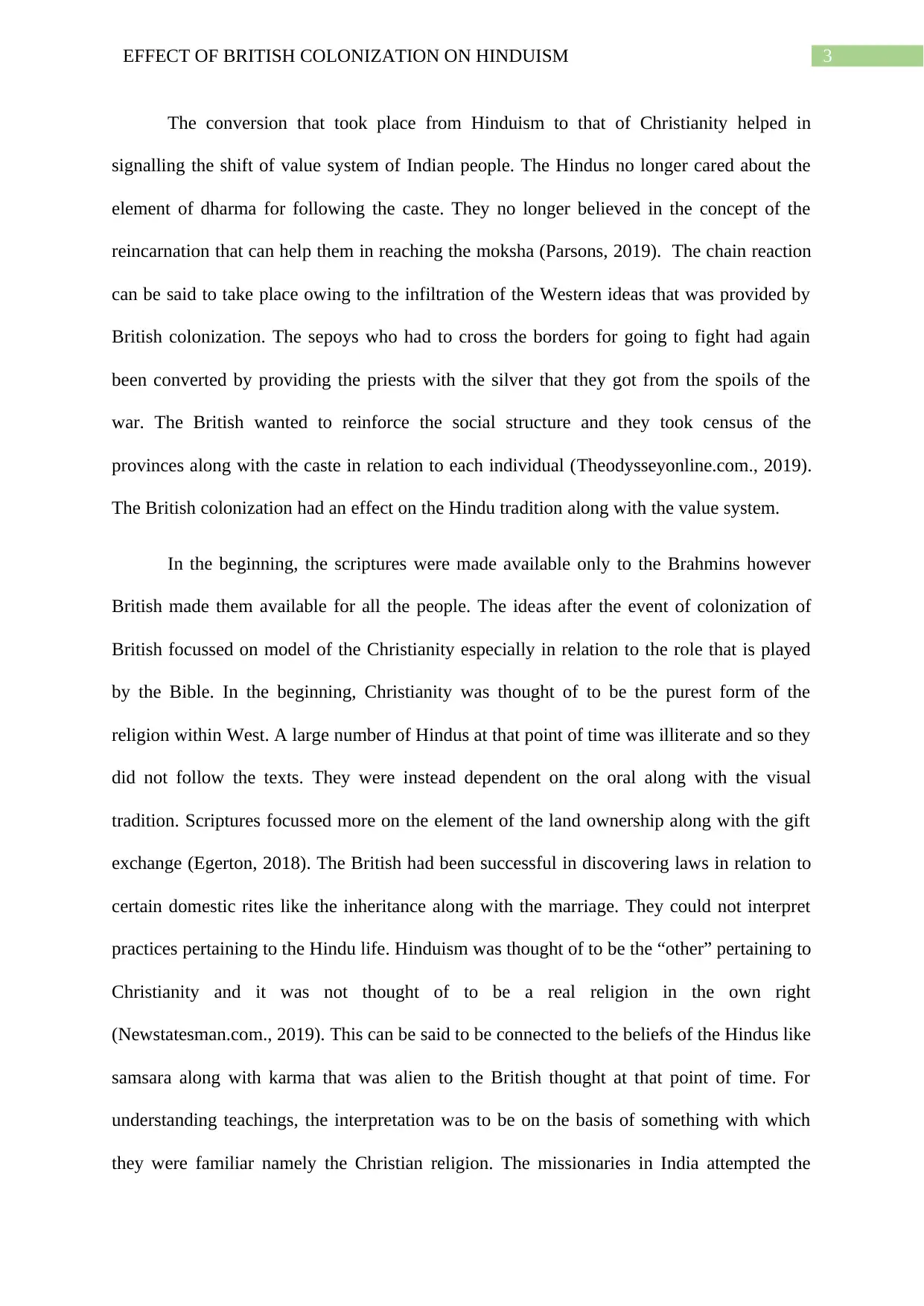
3EFFECT OF BRITISH COLONIZATION ON HINDUISM
The conversion that took place from Hinduism to that of Christianity helped in
signalling the shift of value system of Indian people. The Hindus no longer cared about the
element of dharma for following the caste. They no longer believed in the concept of the
reincarnation that can help them in reaching the moksha (Parsons, 2019). The chain reaction
can be said to take place owing to the infiltration of the Western ideas that was provided by
British colonization. The sepoys who had to cross the borders for going to fight had again
been converted by providing the priests with the silver that they got from the spoils of the
war. The British wanted to reinforce the social structure and they took census of the
provinces along with the caste in relation to each individual (Theodysseyonline.com., 2019).
The British colonization had an effect on the Hindu tradition along with the value system.
In the beginning, the scriptures were made available only to the Brahmins however
British made them available for all the people. The ideas after the event of colonization of
British focussed on model of the Christianity especially in relation to the role that is played
by the Bible. In the beginning, Christianity was thought of to be the purest form of the
religion within West. A large number of Hindus at that point of time was illiterate and so they
did not follow the texts. They were instead dependent on the oral along with the visual
tradition. Scriptures focussed more on the element of the land ownership along with the gift
exchange (Egerton, 2018). The British had been successful in discovering laws in relation to
certain domestic rites like the inheritance along with the marriage. They could not interpret
practices pertaining to the Hindu life. Hinduism was thought of to be the “other” pertaining to
Christianity and it was not thought of to be a real religion in the own right
(Newstatesman.com., 2019). This can be said to be connected to the beliefs of the Hindus like
samsara along with karma that was alien to the British thought at that point of time. For
understanding teachings, the interpretation was to be on the basis of something with which
they were familiar namely the Christian religion. The missionaries in India attempted the
The conversion that took place from Hinduism to that of Christianity helped in
signalling the shift of value system of Indian people. The Hindus no longer cared about the
element of dharma for following the caste. They no longer believed in the concept of the
reincarnation that can help them in reaching the moksha (Parsons, 2019). The chain reaction
can be said to take place owing to the infiltration of the Western ideas that was provided by
British colonization. The sepoys who had to cross the borders for going to fight had again
been converted by providing the priests with the silver that they got from the spoils of the
war. The British wanted to reinforce the social structure and they took census of the
provinces along with the caste in relation to each individual (Theodysseyonline.com., 2019).
The British colonization had an effect on the Hindu tradition along with the value system.
In the beginning, the scriptures were made available only to the Brahmins however
British made them available for all the people. The ideas after the event of colonization of
British focussed on model of the Christianity especially in relation to the role that is played
by the Bible. In the beginning, Christianity was thought of to be the purest form of the
religion within West. A large number of Hindus at that point of time was illiterate and so they
did not follow the texts. They were instead dependent on the oral along with the visual
tradition. Scriptures focussed more on the element of the land ownership along with the gift
exchange (Egerton, 2018). The British had been successful in discovering laws in relation to
certain domestic rites like the inheritance along with the marriage. They could not interpret
practices pertaining to the Hindu life. Hinduism was thought of to be the “other” pertaining to
Christianity and it was not thought of to be a real religion in the own right
(Newstatesman.com., 2019). This can be said to be connected to the beliefs of the Hindus like
samsara along with karma that was alien to the British thought at that point of time. For
understanding teachings, the interpretation was to be on the basis of something with which
they were familiar namely the Christian religion. The missionaries in India attempted the
Secure Best Marks with AI Grader
Need help grading? Try our AI Grader for instant feedback on your assignments.
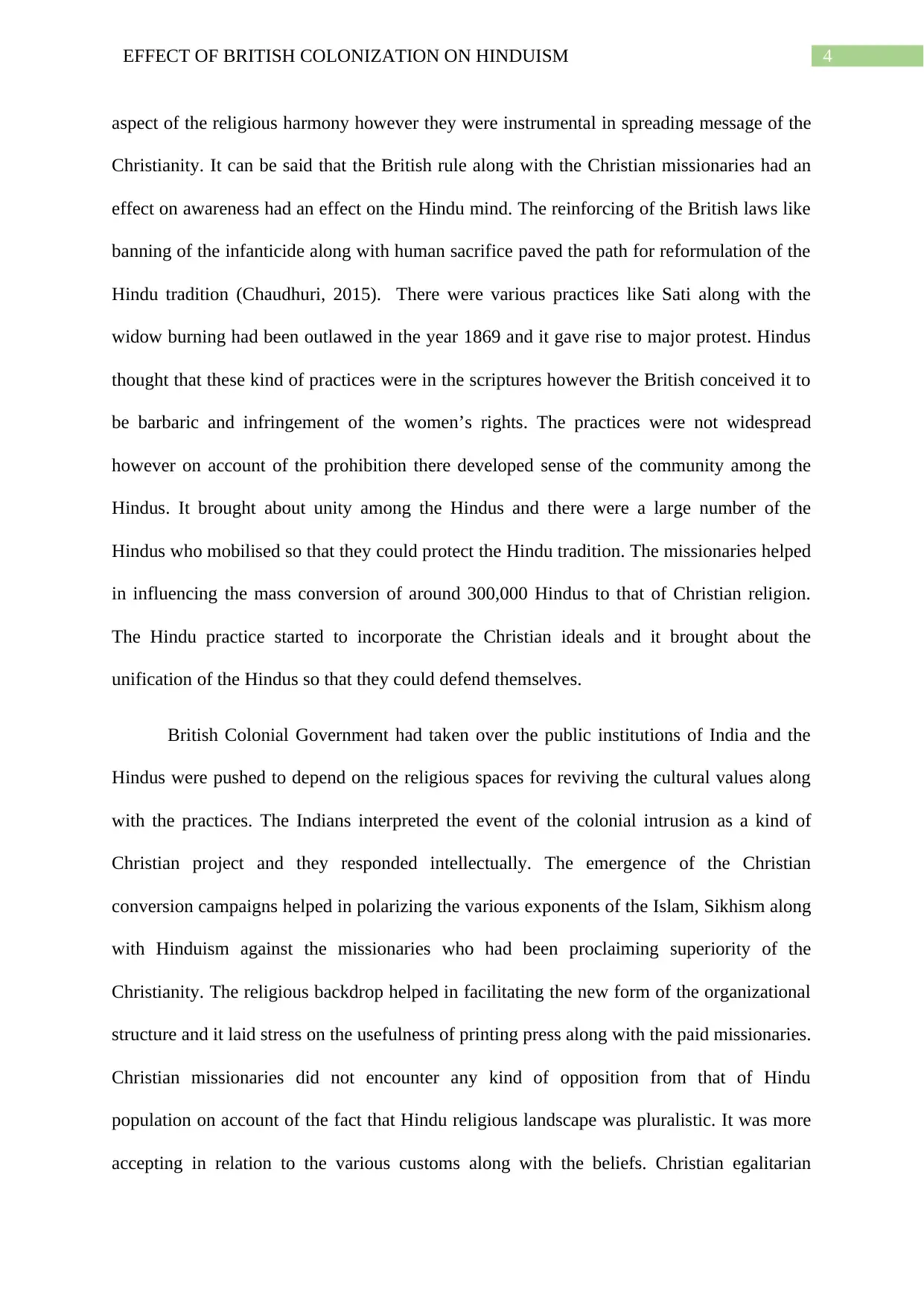
4EFFECT OF BRITISH COLONIZATION ON HINDUISM
aspect of the religious harmony however they were instrumental in spreading message of the
Christianity. It can be said that the British rule along with the Christian missionaries had an
effect on awareness had an effect on the Hindu mind. The reinforcing of the British laws like
banning of the infanticide along with human sacrifice paved the path for reformulation of the
Hindu tradition (Chaudhuri, 2015). There were various practices like Sati along with the
widow burning had been outlawed in the year 1869 and it gave rise to major protest. Hindus
thought that these kind of practices were in the scriptures however the British conceived it to
be barbaric and infringement of the women’s rights. The practices were not widespread
however on account of the prohibition there developed sense of the community among the
Hindus. It brought about unity among the Hindus and there were a large number of the
Hindus who mobilised so that they could protect the Hindu tradition. The missionaries helped
in influencing the mass conversion of around 300,000 Hindus to that of Christian religion.
The Hindu practice started to incorporate the Christian ideals and it brought about the
unification of the Hindus so that they could defend themselves.
British Colonial Government had taken over the public institutions of India and the
Hindus were pushed to depend on the religious spaces for reviving the cultural values along
with the practices. The Indians interpreted the event of the colonial intrusion as a kind of
Christian project and they responded intellectually. The emergence of the Christian
conversion campaigns helped in polarizing the various exponents of the Islam, Sikhism along
with Hinduism against the missionaries who had been proclaiming superiority of the
Christianity. The religious backdrop helped in facilitating the new form of the organizational
structure and it laid stress on the usefulness of printing press along with the paid missionaries.
Christian missionaries did not encounter any kind of opposition from that of Hindu
population on account of the fact that Hindu religious landscape was pluralistic. It was more
accepting in relation to the various customs along with the beliefs. Christian egalitarian
aspect of the religious harmony however they were instrumental in spreading message of the
Christianity. It can be said that the British rule along with the Christian missionaries had an
effect on awareness had an effect on the Hindu mind. The reinforcing of the British laws like
banning of the infanticide along with human sacrifice paved the path for reformulation of the
Hindu tradition (Chaudhuri, 2015). There were various practices like Sati along with the
widow burning had been outlawed in the year 1869 and it gave rise to major protest. Hindus
thought that these kind of practices were in the scriptures however the British conceived it to
be barbaric and infringement of the women’s rights. The practices were not widespread
however on account of the prohibition there developed sense of the community among the
Hindus. It brought about unity among the Hindus and there were a large number of the
Hindus who mobilised so that they could protect the Hindu tradition. The missionaries helped
in influencing the mass conversion of around 300,000 Hindus to that of Christian religion.
The Hindu practice started to incorporate the Christian ideals and it brought about the
unification of the Hindus so that they could defend themselves.
British Colonial Government had taken over the public institutions of India and the
Hindus were pushed to depend on the religious spaces for reviving the cultural values along
with the practices. The Indians interpreted the event of the colonial intrusion as a kind of
Christian project and they responded intellectually. The emergence of the Christian
conversion campaigns helped in polarizing the various exponents of the Islam, Sikhism along
with Hinduism against the missionaries who had been proclaiming superiority of the
Christianity. The religious backdrop helped in facilitating the new form of the organizational
structure and it laid stress on the usefulness of printing press along with the paid missionaries.
Christian missionaries did not encounter any kind of opposition from that of Hindu
population on account of the fact that Hindu religious landscape was pluralistic. It was more
accepting in relation to the various customs along with the beliefs. Christian egalitarian
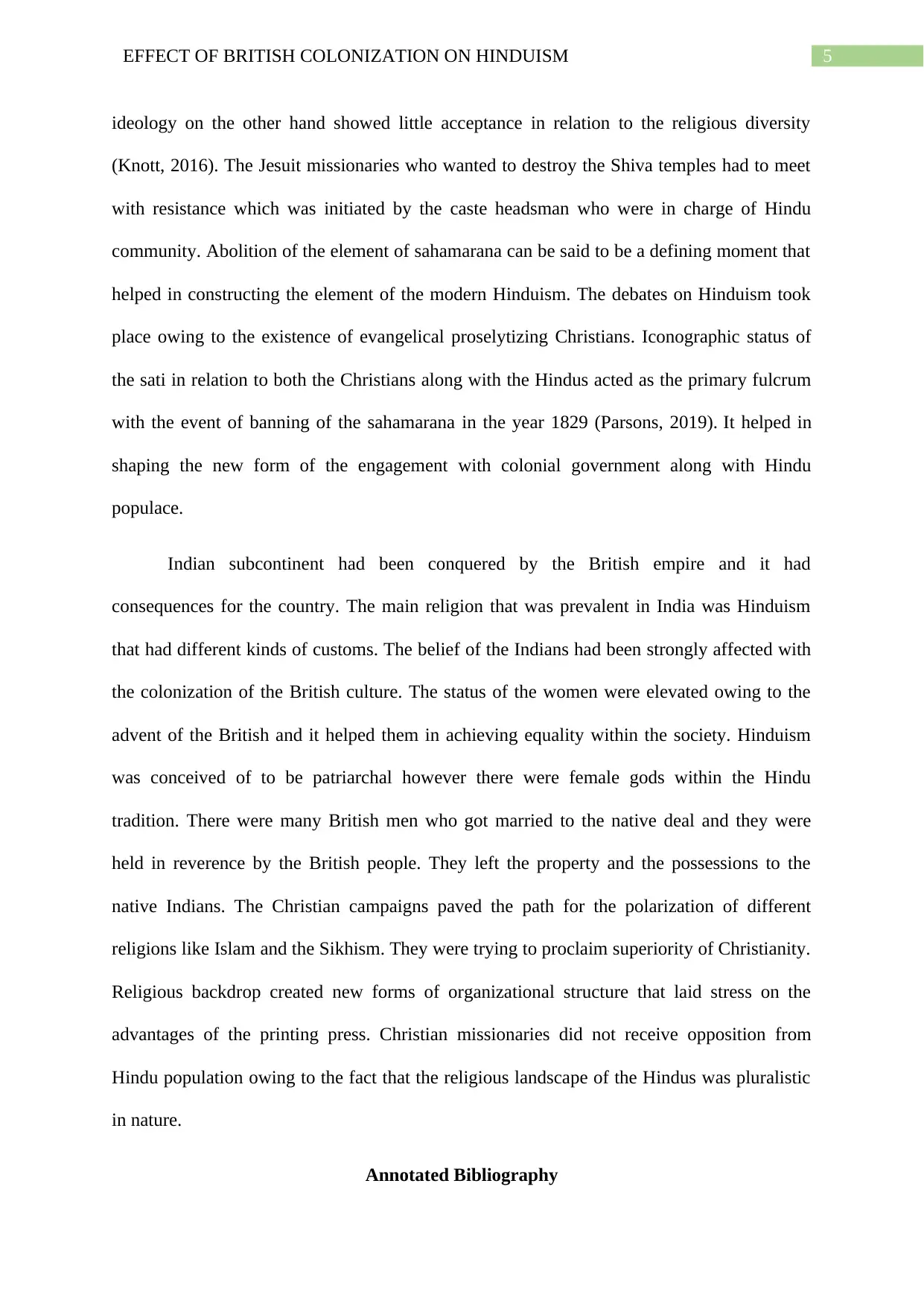
5EFFECT OF BRITISH COLONIZATION ON HINDUISM
ideology on the other hand showed little acceptance in relation to the religious diversity
(Knott, 2016). The Jesuit missionaries who wanted to destroy the Shiva temples had to meet
with resistance which was initiated by the caste headsman who were in charge of Hindu
community. Abolition of the element of sahamarana can be said to be a defining moment that
helped in constructing the element of the modern Hinduism. The debates on Hinduism took
place owing to the existence of evangelical proselytizing Christians. Iconographic status of
the sati in relation to both the Christians along with the Hindus acted as the primary fulcrum
with the event of banning of the sahamarana in the year 1829 (Parsons, 2019). It helped in
shaping the new form of the engagement with colonial government along with Hindu
populace.
Indian subcontinent had been conquered by the British empire and it had
consequences for the country. The main religion that was prevalent in India was Hinduism
that had different kinds of customs. The belief of the Indians had been strongly affected with
the colonization of the British culture. The status of the women were elevated owing to the
advent of the British and it helped them in achieving equality within the society. Hinduism
was conceived of to be patriarchal however there were female gods within the Hindu
tradition. There were many British men who got married to the native deal and they were
held in reverence by the British people. They left the property and the possessions to the
native Indians. The Christian campaigns paved the path for the polarization of different
religions like Islam and the Sikhism. They were trying to proclaim superiority of Christianity.
Religious backdrop created new forms of organizational structure that laid stress on the
advantages of the printing press. Christian missionaries did not receive opposition from
Hindu population owing to the fact that the religious landscape of the Hindus was pluralistic
in nature.
Annotated Bibliography
ideology on the other hand showed little acceptance in relation to the religious diversity
(Knott, 2016). The Jesuit missionaries who wanted to destroy the Shiva temples had to meet
with resistance which was initiated by the caste headsman who were in charge of Hindu
community. Abolition of the element of sahamarana can be said to be a defining moment that
helped in constructing the element of the modern Hinduism. The debates on Hinduism took
place owing to the existence of evangelical proselytizing Christians. Iconographic status of
the sati in relation to both the Christians along with the Hindus acted as the primary fulcrum
with the event of banning of the sahamarana in the year 1829 (Parsons, 2019). It helped in
shaping the new form of the engagement with colonial government along with Hindu
populace.
Indian subcontinent had been conquered by the British empire and it had
consequences for the country. The main religion that was prevalent in India was Hinduism
that had different kinds of customs. The belief of the Indians had been strongly affected with
the colonization of the British culture. The status of the women were elevated owing to the
advent of the British and it helped them in achieving equality within the society. Hinduism
was conceived of to be patriarchal however there were female gods within the Hindu
tradition. There were many British men who got married to the native deal and they were
held in reverence by the British people. They left the property and the possessions to the
native Indians. The Christian campaigns paved the path for the polarization of different
religions like Islam and the Sikhism. They were trying to proclaim superiority of Christianity.
Religious backdrop created new forms of organizational structure that laid stress on the
advantages of the printing press. Christian missionaries did not receive opposition from
Hindu population owing to the fact that the religious landscape of the Hindus was pluralistic
in nature.
Annotated Bibliography
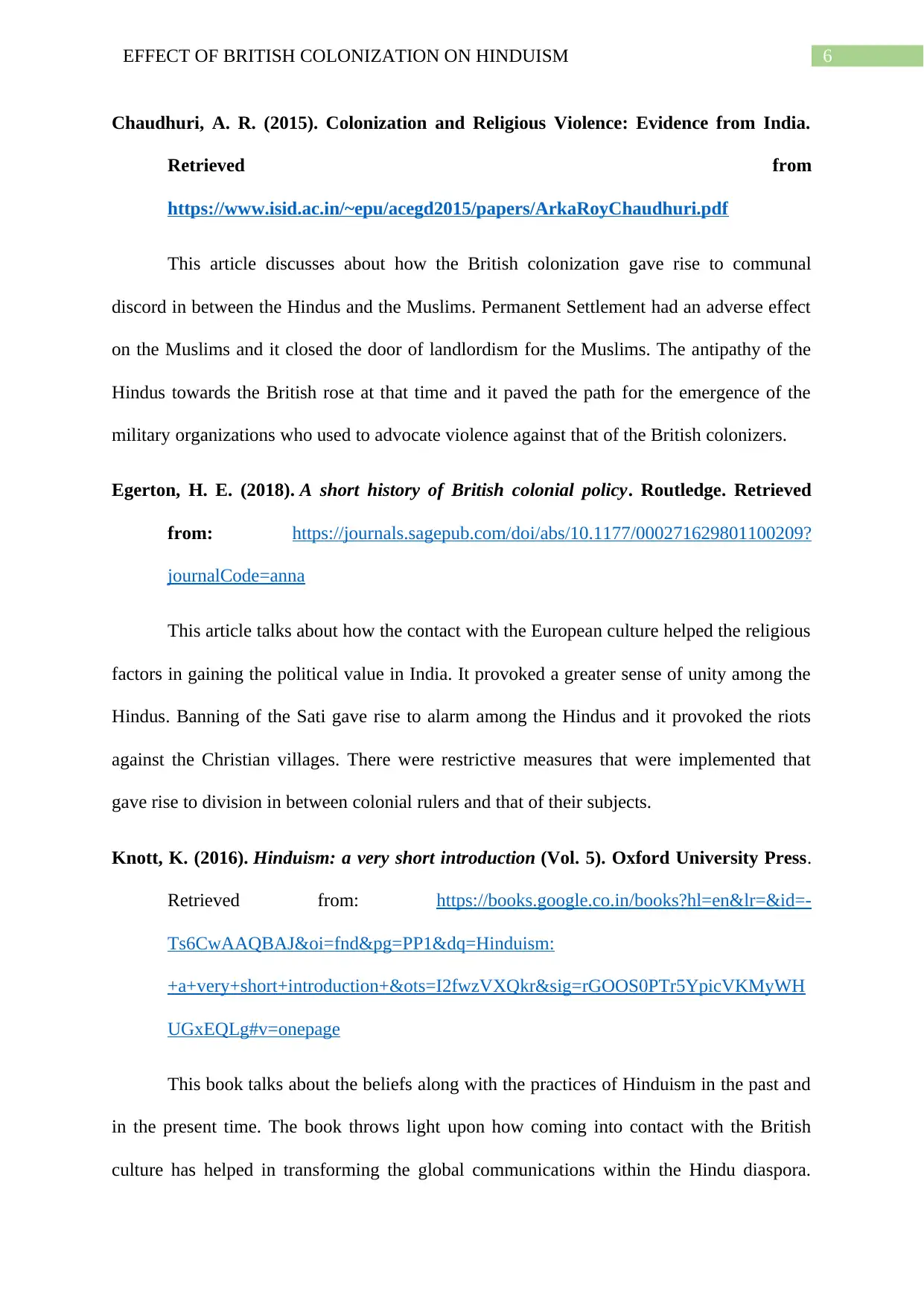
6EFFECT OF BRITISH COLONIZATION ON HINDUISM
Chaudhuri, A. R. (2015). Colonization and Religious Violence: Evidence from India.
Retrieved from
https://www.isid.ac.in/~epu/acegd2015/papers/ArkaRoyChaudhuri.pdf
This article discusses about how the British colonization gave rise to communal
discord in between the Hindus and the Muslims. Permanent Settlement had an adverse effect
on the Muslims and it closed the door of landlordism for the Muslims. The antipathy of the
Hindus towards the British rose at that time and it paved the path for the emergence of the
military organizations who used to advocate violence against that of the British colonizers.
Egerton, H. E. (2018). A short history of British colonial policy. Routledge. Retrieved
from: https://journals.sagepub.com/doi/abs/10.1177/000271629801100209?
journalCode=anna
This article talks about how the contact with the European culture helped the religious
factors in gaining the political value in India. It provoked a greater sense of unity among the
Hindus. Banning of the Sati gave rise to alarm among the Hindus and it provoked the riots
against the Christian villages. There were restrictive measures that were implemented that
gave rise to division in between colonial rulers and that of their subjects.
Knott, K. (2016). Hinduism: a very short introduction (Vol. 5). Oxford University Press.
Retrieved from: https://books.google.co.in/books?hl=en&lr=&id=-
Ts6CwAAQBAJ&oi=fnd&pg=PP1&dq=Hinduism:
+a+very+short+introduction+&ots=I2fwzVXQkr&sig=rGOOS0PTr5YpicVKMyWH
UGxEQLg#v=onepage
This book talks about the beliefs along with the practices of Hinduism in the past and
in the present time. The book throws light upon how coming into contact with the British
culture has helped in transforming the global communications within the Hindu diaspora.
Chaudhuri, A. R. (2015). Colonization and Religious Violence: Evidence from India.
Retrieved from
https://www.isid.ac.in/~epu/acegd2015/papers/ArkaRoyChaudhuri.pdf
This article discusses about how the British colonization gave rise to communal
discord in between the Hindus and the Muslims. Permanent Settlement had an adverse effect
on the Muslims and it closed the door of landlordism for the Muslims. The antipathy of the
Hindus towards the British rose at that time and it paved the path for the emergence of the
military organizations who used to advocate violence against that of the British colonizers.
Egerton, H. E. (2018). A short history of British colonial policy. Routledge. Retrieved
from: https://journals.sagepub.com/doi/abs/10.1177/000271629801100209?
journalCode=anna
This article talks about how the contact with the European culture helped the religious
factors in gaining the political value in India. It provoked a greater sense of unity among the
Hindus. Banning of the Sati gave rise to alarm among the Hindus and it provoked the riots
against the Christian villages. There were restrictive measures that were implemented that
gave rise to division in between colonial rulers and that of their subjects.
Knott, K. (2016). Hinduism: a very short introduction (Vol. 5). Oxford University Press.
Retrieved from: https://books.google.co.in/books?hl=en&lr=&id=-
Ts6CwAAQBAJ&oi=fnd&pg=PP1&dq=Hinduism:
+a+very+short+introduction+&ots=I2fwzVXQkr&sig=rGOOS0PTr5YpicVKMyWH
UGxEQLg#v=onepage
This book talks about the beliefs along with the practices of Hinduism in the past and
in the present time. The book throws light upon how coming into contact with the British
culture has helped in transforming the global communications within the Hindu diaspora.
Paraphrase This Document
Need a fresh take? Get an instant paraphrase of this document with our AI Paraphraser
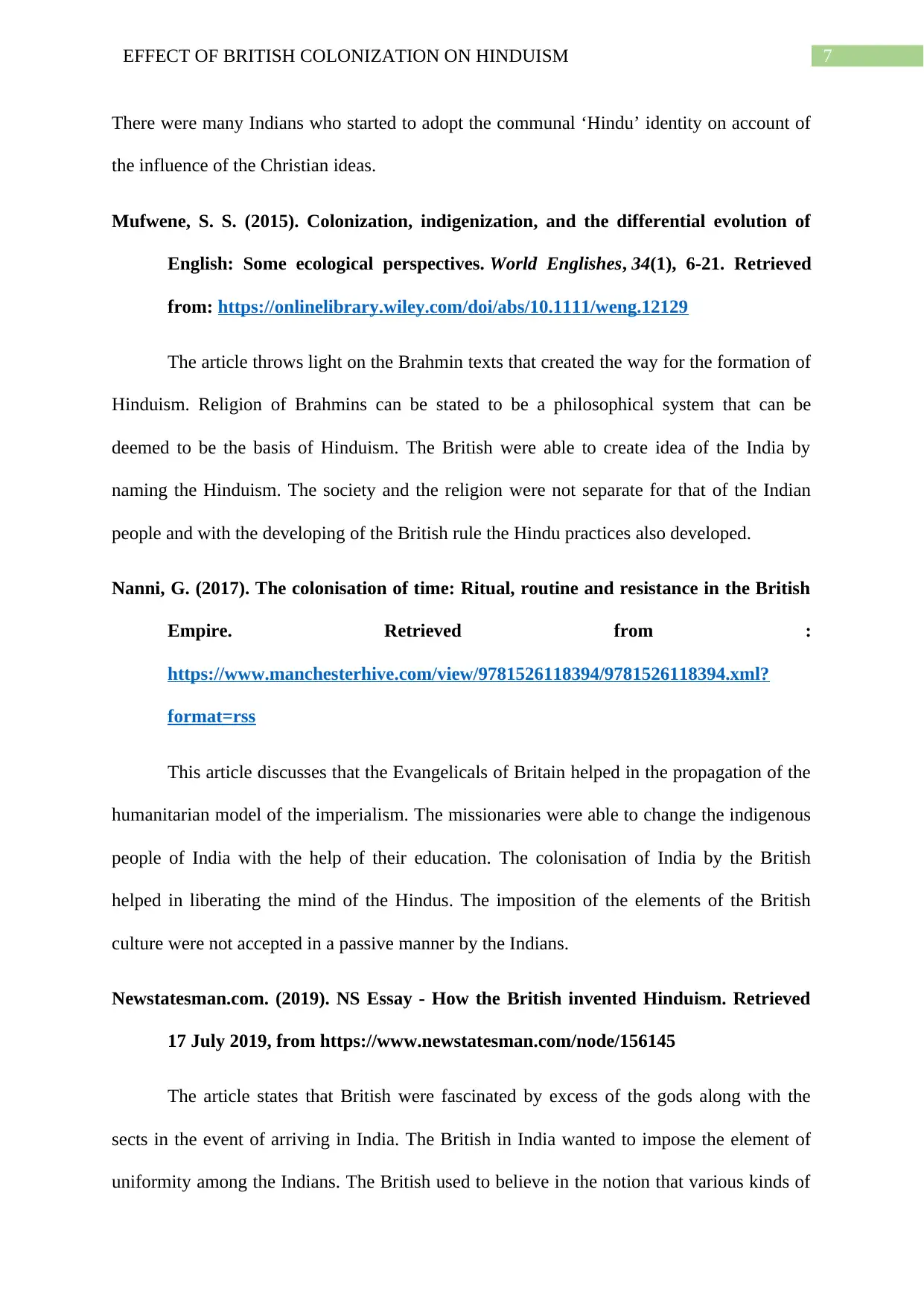
7EFFECT OF BRITISH COLONIZATION ON HINDUISM
There were many Indians who started to adopt the communal ‘Hindu’ identity on account of
the influence of the Christian ideas.
Mufwene, S. S. (2015). Colonization, indigenization, and the differential evolution of
English: Some ecological perspectives. World Englishes, 34(1), 6-21. Retrieved
from: https://onlinelibrary.wiley.com/doi/abs/10.1111/weng.12129
The article throws light on the Brahmin texts that created the way for the formation of
Hinduism. Religion of Brahmins can be stated to be a philosophical system that can be
deemed to be the basis of Hinduism. The British were able to create idea of the India by
naming the Hinduism. The society and the religion were not separate for that of the Indian
people and with the developing of the British rule the Hindu practices also developed.
Nanni, G. (2017). The colonisation of time: Ritual, routine and resistance in the British
Empire. Retrieved from :
https://www.manchesterhive.com/view/9781526118394/9781526118394.xml?
format=rss
This article discusses that the Evangelicals of Britain helped in the propagation of the
humanitarian model of the imperialism. The missionaries were able to change the indigenous
people of India with the help of their education. The colonisation of India by the British
helped in liberating the mind of the Hindus. The imposition of the elements of the British
culture were not accepted in a passive manner by the Indians.
Newstatesman.com. (2019). NS Essay - How the British invented Hinduism. Retrieved
17 July 2019, from https://www.newstatesman.com/node/156145
The article states that British were fascinated by excess of the gods along with the
sects in the event of arriving in India. The British in India wanted to impose the element of
uniformity among the Indians. The British used to believe in the notion that various kinds of
There were many Indians who started to adopt the communal ‘Hindu’ identity on account of
the influence of the Christian ideas.
Mufwene, S. S. (2015). Colonization, indigenization, and the differential evolution of
English: Some ecological perspectives. World Englishes, 34(1), 6-21. Retrieved
from: https://onlinelibrary.wiley.com/doi/abs/10.1111/weng.12129
The article throws light on the Brahmin texts that created the way for the formation of
Hinduism. Religion of Brahmins can be stated to be a philosophical system that can be
deemed to be the basis of Hinduism. The British were able to create idea of the India by
naming the Hinduism. The society and the religion were not separate for that of the Indian
people and with the developing of the British rule the Hindu practices also developed.
Nanni, G. (2017). The colonisation of time: Ritual, routine and resistance in the British
Empire. Retrieved from :
https://www.manchesterhive.com/view/9781526118394/9781526118394.xml?
format=rss
This article discusses that the Evangelicals of Britain helped in the propagation of the
humanitarian model of the imperialism. The missionaries were able to change the indigenous
people of India with the help of their education. The colonisation of India by the British
helped in liberating the mind of the Hindus. The imposition of the elements of the British
culture were not accepted in a passive manner by the Indians.
Newstatesman.com. (2019). NS Essay - How the British invented Hinduism. Retrieved
17 July 2019, from https://www.newstatesman.com/node/156145
The article states that British were fascinated by excess of the gods along with the
sects in the event of arriving in India. The British in India wanted to impose the element of
uniformity among the Indians. The British used to believe in the notion that various kinds of
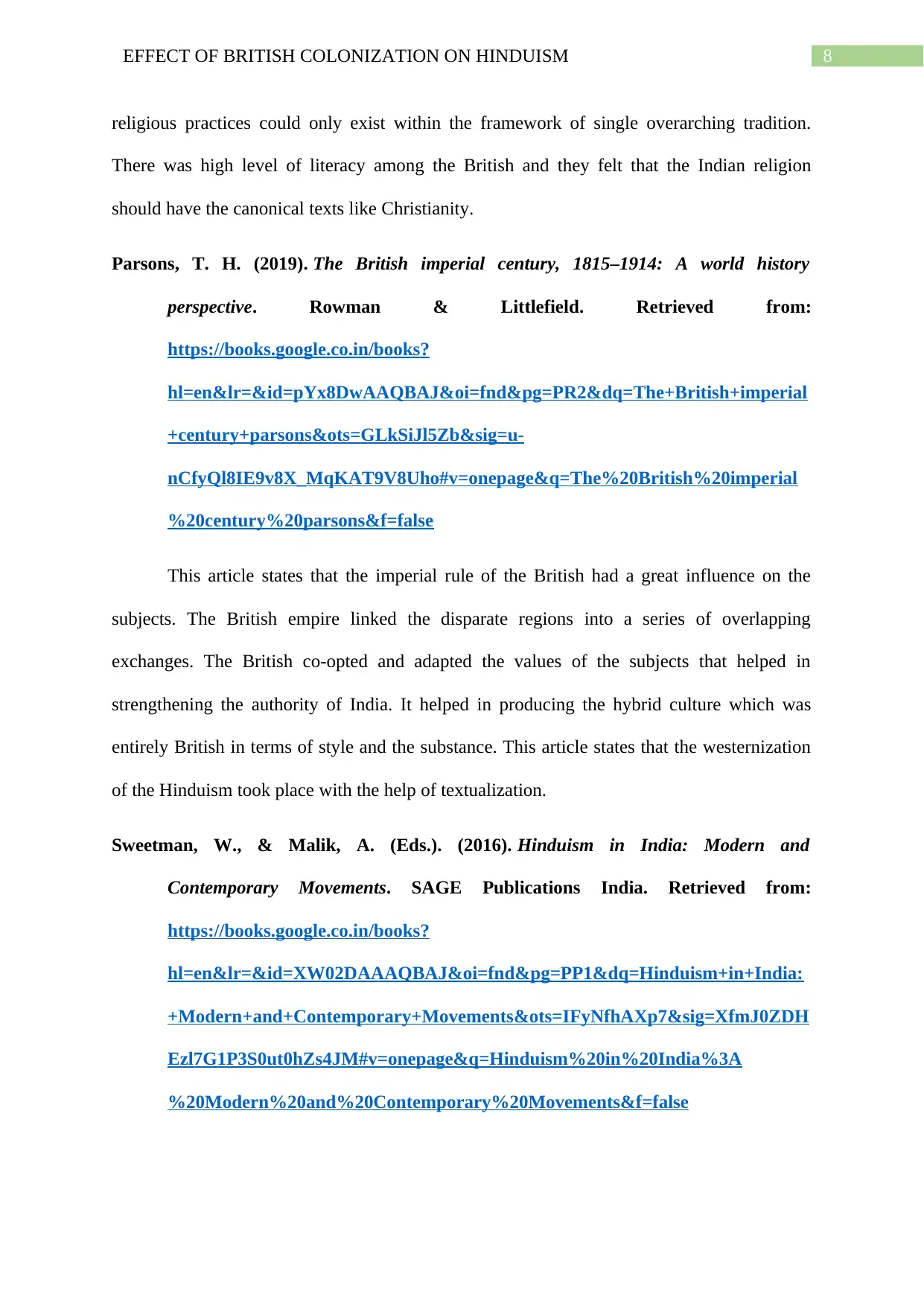
8EFFECT OF BRITISH COLONIZATION ON HINDUISM
religious practices could only exist within the framework of single overarching tradition.
There was high level of literacy among the British and they felt that the Indian religion
should have the canonical texts like Christianity.
Parsons, T. H. (2019). The British imperial century, 1815–1914: A world history
perspective. Rowman & Littlefield. Retrieved from:
https://books.google.co.in/books?
hl=en&lr=&id=pYx8DwAAQBAJ&oi=fnd&pg=PR2&dq=The+British+imperial
+century+parsons&ots=GLkSiJl5Zb&sig=u-
nCfyQl8IE9v8X_MqKAT9V8Uho#v=onepage&q=The%20British%20imperial
%20century%20parsons&f=false
This article states that the imperial rule of the British had a great influence on the
subjects. The British empire linked the disparate regions into a series of overlapping
exchanges. The British co-opted and adapted the values of the subjects that helped in
strengthening the authority of India. It helped in producing the hybrid culture which was
entirely British in terms of style and the substance. This article states that the westernization
of the Hinduism took place with the help of textualization.
Sweetman, W., & Malik, A. (Eds.). (2016). Hinduism in India: Modern and
Contemporary Movements. SAGE Publications India. Retrieved from:
https://books.google.co.in/books?
hl=en&lr=&id=XW02DAAAQBAJ&oi=fnd&pg=PP1&dq=Hinduism+in+India:
+Modern+and+Contemporary+Movements&ots=IFyNfhAXp7&sig=XfmJ0ZDH
Ezl7G1P3S0ut0hZs4JM#v=onepage&q=Hinduism%20in%20India%3A
%20Modern%20and%20Contemporary%20Movements&f=false
religious practices could only exist within the framework of single overarching tradition.
There was high level of literacy among the British and they felt that the Indian religion
should have the canonical texts like Christianity.
Parsons, T. H. (2019). The British imperial century, 1815–1914: A world history
perspective. Rowman & Littlefield. Retrieved from:
https://books.google.co.in/books?
hl=en&lr=&id=pYx8DwAAQBAJ&oi=fnd&pg=PR2&dq=The+British+imperial
+century+parsons&ots=GLkSiJl5Zb&sig=u-
nCfyQl8IE9v8X_MqKAT9V8Uho#v=onepage&q=The%20British%20imperial
%20century%20parsons&f=false
This article states that the imperial rule of the British had a great influence on the
subjects. The British empire linked the disparate regions into a series of overlapping
exchanges. The British co-opted and adapted the values of the subjects that helped in
strengthening the authority of India. It helped in producing the hybrid culture which was
entirely British in terms of style and the substance. This article states that the westernization
of the Hinduism took place with the help of textualization.
Sweetman, W., & Malik, A. (Eds.). (2016). Hinduism in India: Modern and
Contemporary Movements. SAGE Publications India. Retrieved from:
https://books.google.co.in/books?
hl=en&lr=&id=XW02DAAAQBAJ&oi=fnd&pg=PP1&dq=Hinduism+in+India:
+Modern+and+Contemporary+Movements&ots=IFyNfhAXp7&sig=XfmJ0ZDH
Ezl7G1P3S0ut0hZs4JM#v=onepage&q=Hinduism%20in%20India%3A
%20Modern%20and%20Contemporary%20Movements&f=false
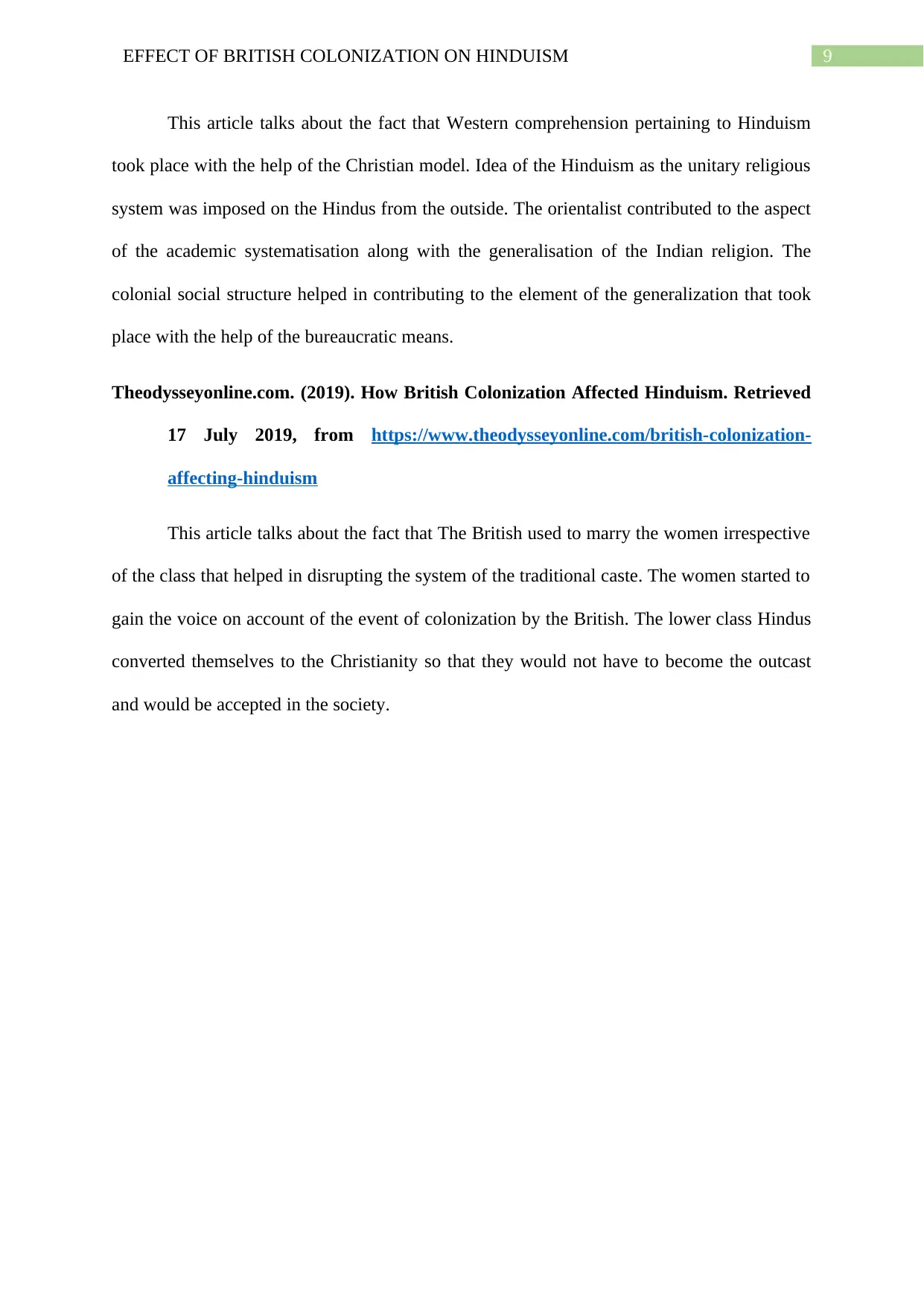
9EFFECT OF BRITISH COLONIZATION ON HINDUISM
This article talks about the fact that Western comprehension pertaining to Hinduism
took place with the help of the Christian model. Idea of the Hinduism as the unitary religious
system was imposed on the Hindus from the outside. The orientalist contributed to the aspect
of the academic systematisation along with the generalisation of the Indian religion. The
colonial social structure helped in contributing to the element of the generalization that took
place with the help of the bureaucratic means.
Theodysseyonline.com. (2019). How British Colonization Affected Hinduism. Retrieved
17 July 2019, from https://www.theodysseyonline.com/british-colonization-
affecting-hinduism
This article talks about the fact that The British used to marry the women irrespective
of the class that helped in disrupting the system of the traditional caste. The women started to
gain the voice on account of the event of colonization by the British. The lower class Hindus
converted themselves to the Christianity so that they would not have to become the outcast
and would be accepted in the society.
This article talks about the fact that Western comprehension pertaining to Hinduism
took place with the help of the Christian model. Idea of the Hinduism as the unitary religious
system was imposed on the Hindus from the outside. The orientalist contributed to the aspect
of the academic systematisation along with the generalisation of the Indian religion. The
colonial social structure helped in contributing to the element of the generalization that took
place with the help of the bureaucratic means.
Theodysseyonline.com. (2019). How British Colonization Affected Hinduism. Retrieved
17 July 2019, from https://www.theodysseyonline.com/british-colonization-
affecting-hinduism
This article talks about the fact that The British used to marry the women irrespective
of the class that helped in disrupting the system of the traditional caste. The women started to
gain the voice on account of the event of colonization by the British. The lower class Hindus
converted themselves to the Christianity so that they would not have to become the outcast
and would be accepted in the society.
Secure Best Marks with AI Grader
Need help grading? Try our AI Grader for instant feedback on your assignments.
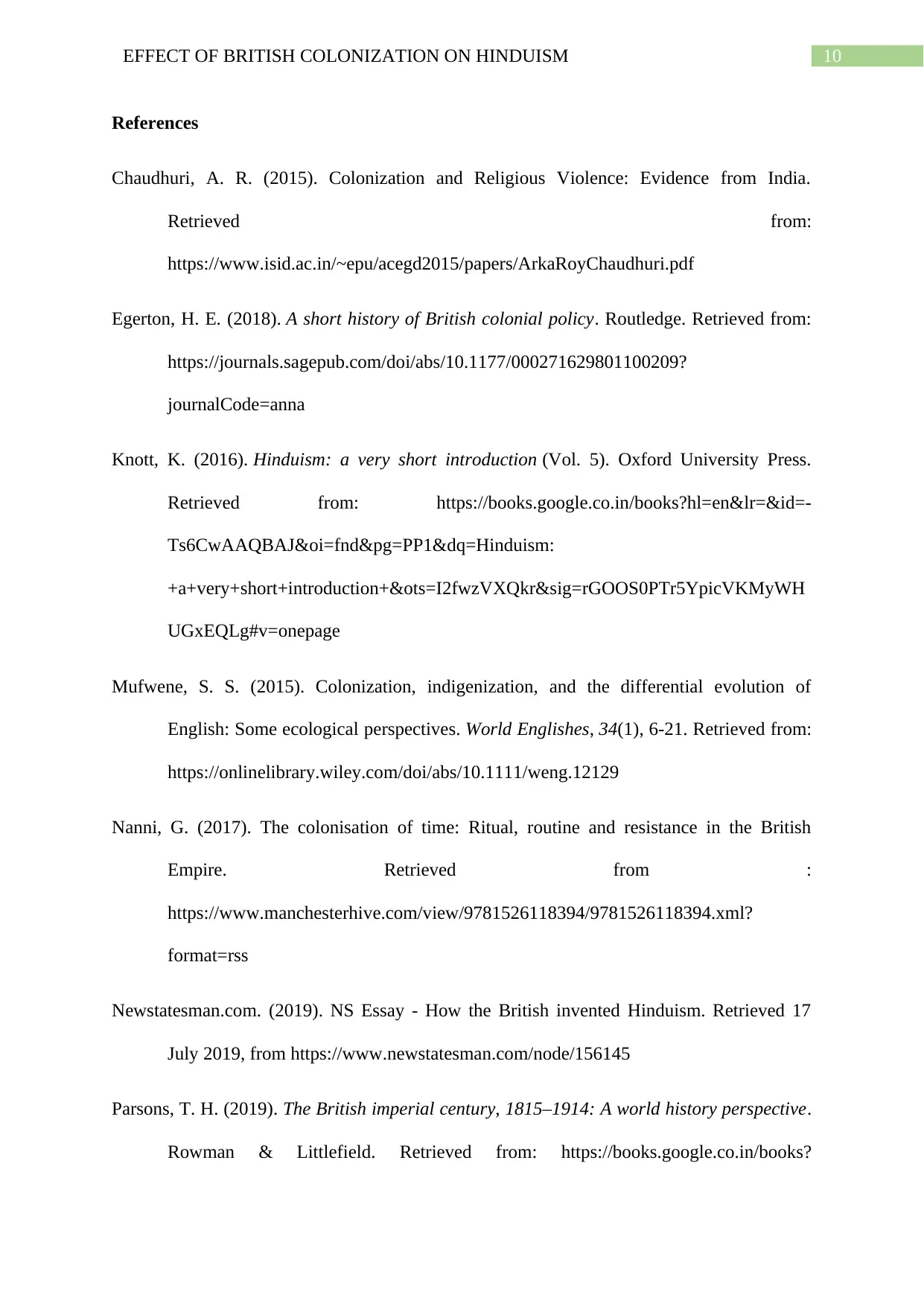
10EFFECT OF BRITISH COLONIZATION ON HINDUISM
References
Chaudhuri, A. R. (2015). Colonization and Religious Violence: Evidence from India.
Retrieved from:
https://www.isid.ac.in/~epu/acegd2015/papers/ArkaRoyChaudhuri.pdf
Egerton, H. E. (2018). A short history of British colonial policy. Routledge. Retrieved from:
https://journals.sagepub.com/doi/abs/10.1177/000271629801100209?
journalCode=anna
Knott, K. (2016). Hinduism: a very short introduction (Vol. 5). Oxford University Press.
Retrieved from: https://books.google.co.in/books?hl=en&lr=&id=-
Ts6CwAAQBAJ&oi=fnd&pg=PP1&dq=Hinduism:
+a+very+short+introduction+&ots=I2fwzVXQkr&sig=rGOOS0PTr5YpicVKMyWH
UGxEQLg#v=onepage
Mufwene, S. S. (2015). Colonization, indigenization, and the differential evolution of
English: Some ecological perspectives. World Englishes, 34(1), 6-21. Retrieved from:
https://onlinelibrary.wiley.com/doi/abs/10.1111/weng.12129
Nanni, G. (2017). The colonisation of time: Ritual, routine and resistance in the British
Empire. Retrieved from :
https://www.manchesterhive.com/view/9781526118394/9781526118394.xml?
format=rss
Newstatesman.com. (2019). NS Essay - How the British invented Hinduism. Retrieved 17
July 2019, from https://www.newstatesman.com/node/156145
Parsons, T. H. (2019). The British imperial century, 1815–1914: A world history perspective.
Rowman & Littlefield. Retrieved from: https://books.google.co.in/books?
References
Chaudhuri, A. R. (2015). Colonization and Religious Violence: Evidence from India.
Retrieved from:
https://www.isid.ac.in/~epu/acegd2015/papers/ArkaRoyChaudhuri.pdf
Egerton, H. E. (2018). A short history of British colonial policy. Routledge. Retrieved from:
https://journals.sagepub.com/doi/abs/10.1177/000271629801100209?
journalCode=anna
Knott, K. (2016). Hinduism: a very short introduction (Vol. 5). Oxford University Press.
Retrieved from: https://books.google.co.in/books?hl=en&lr=&id=-
Ts6CwAAQBAJ&oi=fnd&pg=PP1&dq=Hinduism:
+a+very+short+introduction+&ots=I2fwzVXQkr&sig=rGOOS0PTr5YpicVKMyWH
UGxEQLg#v=onepage
Mufwene, S. S. (2015). Colonization, indigenization, and the differential evolution of
English: Some ecological perspectives. World Englishes, 34(1), 6-21. Retrieved from:
https://onlinelibrary.wiley.com/doi/abs/10.1111/weng.12129
Nanni, G. (2017). The colonisation of time: Ritual, routine and resistance in the British
Empire. Retrieved from :
https://www.manchesterhive.com/view/9781526118394/9781526118394.xml?
format=rss
Newstatesman.com. (2019). NS Essay - How the British invented Hinduism. Retrieved 17
July 2019, from https://www.newstatesman.com/node/156145
Parsons, T. H. (2019). The British imperial century, 1815–1914: A world history perspective.
Rowman & Littlefield. Retrieved from: https://books.google.co.in/books?
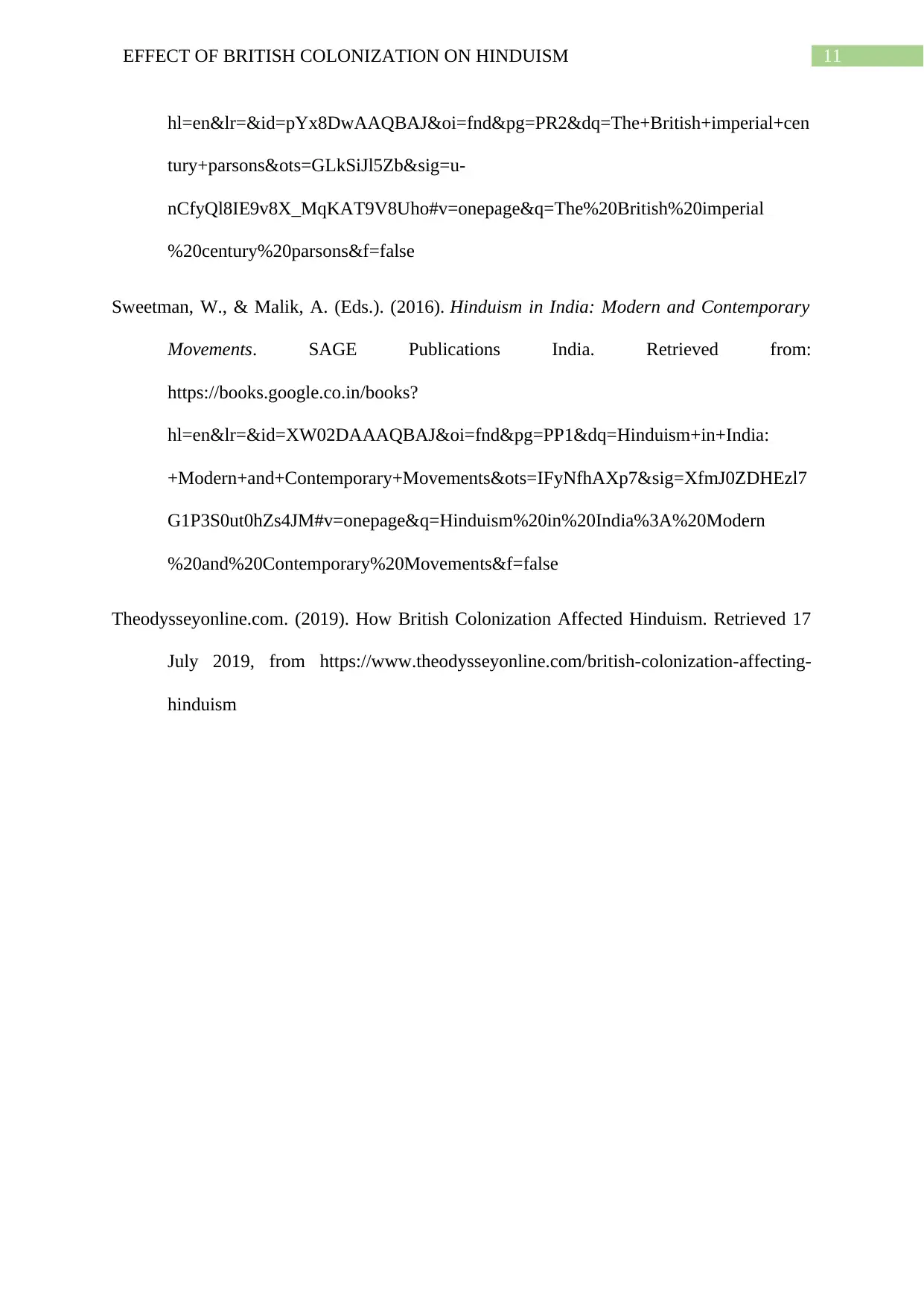
11EFFECT OF BRITISH COLONIZATION ON HINDUISM
hl=en&lr=&id=pYx8DwAAQBAJ&oi=fnd&pg=PR2&dq=The+British+imperial+cen
tury+parsons&ots=GLkSiJl5Zb&sig=u-
nCfyQl8IE9v8X_MqKAT9V8Uho#v=onepage&q=The%20British%20imperial
%20century%20parsons&f=false
Sweetman, W., & Malik, A. (Eds.). (2016). Hinduism in India: Modern and Contemporary
Movements. SAGE Publications India. Retrieved from:
https://books.google.co.in/books?
hl=en&lr=&id=XW02DAAAQBAJ&oi=fnd&pg=PP1&dq=Hinduism+in+India:
+Modern+and+Contemporary+Movements&ots=IFyNfhAXp7&sig=XfmJ0ZDHEzl7
G1P3S0ut0hZs4JM#v=onepage&q=Hinduism%20in%20India%3A%20Modern
%20and%20Contemporary%20Movements&f=false
Theodysseyonline.com. (2019). How British Colonization Affected Hinduism. Retrieved 17
July 2019, from https://www.theodysseyonline.com/british-colonization-affecting-
hinduism
hl=en&lr=&id=pYx8DwAAQBAJ&oi=fnd&pg=PR2&dq=The+British+imperial+cen
tury+parsons&ots=GLkSiJl5Zb&sig=u-
nCfyQl8IE9v8X_MqKAT9V8Uho#v=onepage&q=The%20British%20imperial
%20century%20parsons&f=false
Sweetman, W., & Malik, A. (Eds.). (2016). Hinduism in India: Modern and Contemporary
Movements. SAGE Publications India. Retrieved from:
https://books.google.co.in/books?
hl=en&lr=&id=XW02DAAAQBAJ&oi=fnd&pg=PP1&dq=Hinduism+in+India:
+Modern+and+Contemporary+Movements&ots=IFyNfhAXp7&sig=XfmJ0ZDHEzl7
G1P3S0ut0hZs4JM#v=onepage&q=Hinduism%20in%20India%3A%20Modern
%20and%20Contemporary%20Movements&f=false
Theodysseyonline.com. (2019). How British Colonization Affected Hinduism. Retrieved 17
July 2019, from https://www.theodysseyonline.com/british-colonization-affecting-
hinduism
1 out of 12
Your All-in-One AI-Powered Toolkit for Academic Success.
+13062052269
info@desklib.com
Available 24*7 on WhatsApp / Email
![[object Object]](/_next/static/media/star-bottom.7253800d.svg)
Unlock your academic potential
© 2024 | Zucol Services PVT LTD | All rights reserved.





